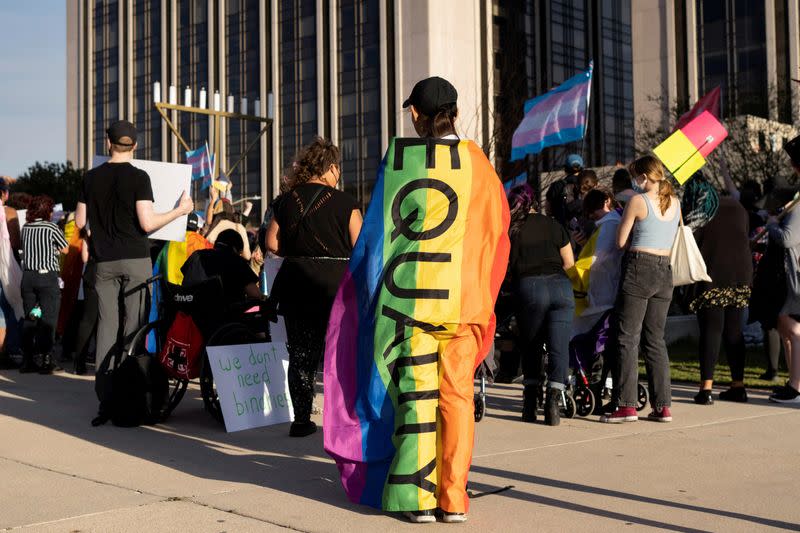Texas top court upholds ban on gender-affirming care for minors

By Nate Raymond
(Reuters) - The Texas Supreme Court on Friday dealt LGBTQ rights advocates a blow by refusing to block a Republican-backed state law that bans transgender minors from being provided gender-affirming medical care, such as puberty blockers and hormones.
The court on an 8-1 vote rejected arguments by families with transgender children and doctors that the law was discriminatory and deprived parents of their rights under the state constitution to make decisions concerning their children's care.
The U.S. Supreme Court on Monday agreed to consider the legality of a similar ban in Tennessee and address an issue that has become a focal point of lawmaking in Republican-led states.
Twenty-five states have enacted laws or policies that ban or restrict gender-affirming care for minors, according to the Movement Advancement Project, an LGBTQ think tank.
The Texas law took effect on Sept. 1 after Republican Governor Greg Abbott signed it in June 2023. It bars doctors from providing minors under the age of 18 procedures and treatments for gender transitioning or gender dysphoria.
Several parents of children with gender dysphoria, along with doctors and advocacy groups, sued to block the law's enforcement, and a judge last year concluded the law likely violated the Texas Constitution and enjoined its enforcement.
The Texas Supreme Court, though, allowed the law to take effect while Republican Attorney General Ken Paxton's office appealed, and on Friday concluded the law was constitutional.
Justice Rebeca Huddle, writing for the majority, said that while parents have a fundamental interest in directing their children's care free from government interference, that interest was not absolute and the legislature was not powerless to regulate medicine.
She said the legislature made a "permissible, rational policy choice to limit the types of available medical procedures for children, particularly in light of the relative nascency of both gender dysphoria and its various modes of treatment."
Karen Loewy, a lawyer for the plaintiffs at Lambda Legal, said in a statement it was "impossible to overstate the devastating impact of this cruel and arbitrary ruling on Texas transgender youth and the families that love and support them."
The Texas Supreme Court comprises only Republicans, and only Justice Debra Lehrmann dissented. She called the ban "cruel" and warned of the consequences of denying transgender children treatment, citing data showing a high risk of suicide among that population.
"Surely the right of parents to make medical decisions, in consultation with their physicians, regarding the welfare of their children is worthy of more constitutional protection than the Court recognizes today," she wrote.
(Reporting by Nate Raymond in Boston, Editing by Alexia Garamfalvi and Richard Chang)


